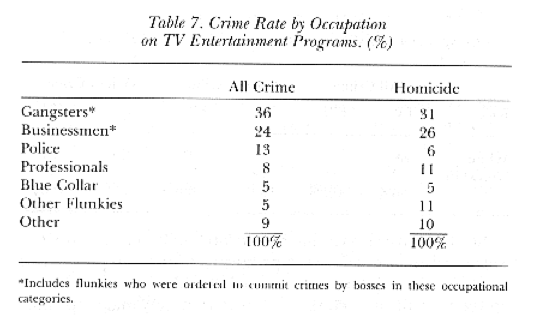Sign up for the daily CJR newsletter.
CNBC’s Joe Kernen reports the news in the morning in a fast-paced environment where it’s difficult to be 100% accurate. If you write a book, by contrast, you have the time to make sure you get things right. So it’s good to see that now Kernen is plugging his book, he has no time for baseless factoids. Oh, who am I kidding:
Q: Give us some examples of how you see business people portrayed in the media.
A: There was a study done of TV which looked at hundreds of hours of prime time. You were four times more likely to commit a crime if you were a CEO than if you were a drug dealer or a gang leader.
Does he mean this study, by Ray Surette, author of Media, Crime, and Criminal Justice: Images, Realities and Policies? Here’s what it found:

Hm, no, he can’t mean that study, because it doesn’t show anything like what Kernen is talking about. Businessmen only accounted for 24% of crimes on TV even when you include crimes which were ordered by businessmen but carried out by professional-criminal flunkies. Meanwhile, it stands to reason that 100% of drug dealers on TV commit a crime — since by definition they’re being portrayed as illegally dealing drugs.
So maybe Kernen’s not quoting a study at all, and instead is quoting a half-remembered 1979 polemic by — wait for it — Ben Stein. Cecil Greek summarizes:
Ben Stein wondered why prime time crime consisted almost exclusively of white upper-class violence. After watching thousands of hours of TV crime shows, he reported never to have seen a major crime committed by a poor, teenage, black, Mexican, or Puerto Rican youth, even though in reality they account for a high percentage of violent crime.
Most likely, Kernen’s just quoting something somebody told him at dinner one evening, and which sounded too good to fact-check. After all, that’s the way that CNBC works. You just put a lot of shouty people on the TV saying things of dubious coherence, sit back, and enjoy the cacophony.
Kernen works in a world where ratings are more important than accuracy, and he’s just carrying that philosophy over to the book-publishing business. I doubt that his publishers, the “dedicated conservative imprint” Sentinel, mind in the slightest.
Has America ever needed a media defender more than now? Help us by joining CJR today.






